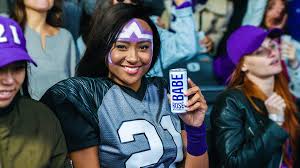 Watchdogging
Watchdogging  In the Doghouse
In the Doghouse  Babe Wine: Condescending, Concentrated, and #COVIDwashed
Babe Wine: Condescending, Concentrated, and #COVIDwashedBabe Wine: Condescending, Concentrated, and #COVIDwashed
 There are several marketing strategies that are guaranteed to get a product in the AJ doghouse. Does it used gendered branding to target women? Does it piggyback on a sports sponsorship, thus reaching tens of millions of underage viewers? Is it formulated and packaged in a way to all but guarantee dangerous consumption patterns?
There are several marketing strategies that are guaranteed to get a product in the AJ doghouse. Does it used gendered branding to target women? Does it piggyback on a sports sponsorship, thus reaching tens of millions of underage viewers? Is it formulated and packaged in a way to all but guarantee dangerous consumption patterns?
Annheuser-Busch InBev’s newly acquired Babe Wine does all three, and shamelessly adds another: urging consumers to drink to ease the anxiety that accompanies the global COVID-19 outbreak. This is a remarkable quadfecta of contempt for consumers.
Babe was initially brought to market by a group headed up by Josh Ostrovsky, an internet influencer known also as The Fat Jew. Ostrovsky, already notorious for stealing other online comedians’ work and passing it off as his own, joined with two business partners to launch a brand targeted squarely at young women. Co-founder David Oliver Cohen told Fortune magazine, “One thing that stood out to us was there was nothing in the wine and spirits space for women and younger drinkers to drink at sporting events and concert venues.”
Yet this targeting is of particular concern. Women currently make for a ripe target for the alcohol industry in the United States, having drank less frequently and at less volume than men in the past. This gap has closed quickly, however, and the surge of consumption among women has created an identical surge in diagnoses of alcohol use disorder (AUD). This is compounded by the fact that women who drink face risks that men do not, particularly a dramatically increased risk of breast cancer.
Needless to say, this risk has also meant a windfall for Big Alcohol.
AB InBev has been quick to enjoy this windfall, buying Babe out (but continuing its association with Ostrovsky) and making it the official wine of the NFL. Because alcohol marketing through sporting events—and AB InBev’s ownership of NFL marketing in particular—reaches tens of millions of youth nationally, Babe is positioning itself to be attractive to underage girls. Since exposure to alcohol marketing predicts younger drinking, and since the earlier someone starts drinking the more likely they are to develop unhealthy drinking patterns, Babe and the NFL become a perfect vortex to bring additional alcohol harm to young women.
This is worsened by the fact that Babe is stronger than beer, and dramatically so. A can of Budweiser is around 4% alcohol by volume. A can of Babe, on the other hand, is three times as strong. A single can would bring a drinker to threshold of binge drinking for women; two cans would go well beyond binge level for woman or men.
Yet this is made worse yet by Babe’s newest ad campaign. In an email headlined “WE JUST WANT YOU TO BE HAPPY,” the brand proudly boasts “We are the official wine of daydrinking and falling asleep by 10pm so you don’t wake up feeling like a complete garbage.” [sic] This email, which comes with a discount code for ordering in bulk, was sent in late April. In short, it takes advantage of laxened restrictions around delivery to promote all-day drinking during COVID-related shelter-in-place orders. This is not just tacky and tone deaf, it is another example of Big Alcohol deliberately undermining public health.
There are multiple issues surrounding the world’s treatment of alcohol during this crisis. Among them is a reckless promotion of alcohol purchasing as an economic driver, even though alcohol a) lowers inhibitions thus encouraging reckless behavior; b) is associated with domestic violence and other interpersonal trauma; and c) suppresses the immune system. The WHO strongly recommends limiting, not promoting, alcohol access during lockdowns. Yet instead, many common-sense alcohol regulations have been lifted throughout the United States.
In the case of a product like Babe, even the commonly used excuse—that loosened alcohol sale regulations provide economic protections for the service industry—are rendered meaningless. Annheuser-Busch InBev is a multinational alcohol megacorporation; there is no benefit to communities in allowing it to drop cases of a high-potency wine targeted at (very) young women on peoples’ doorsteps. This is #COVIDwashing pure and simple: capitalizing on the fear, misery, and confusion in a time of illness to make money from a product that kills as relentlessly as any virus.
READ MORE about reckless alcohol deregulation in response to COVID-19.
READ MORE about pinkwashing—the industry practice of targeting women using breast cancer awareness to sell a cancer-causing product.
WATCH Fake Randy Diaz tell us to get AB InBev out of the NFL.
Help us hold Big Alcohol accountable for the harm its products cause.
| GET ACTION ALERTS AND eNEWS |
STAY CONNECTED    |
CONTACT US 24 Belvedere St. San Rafael, CA 94901 415-456-5692 |
SUPPORT US Terms of Service & Privacy Policy |

